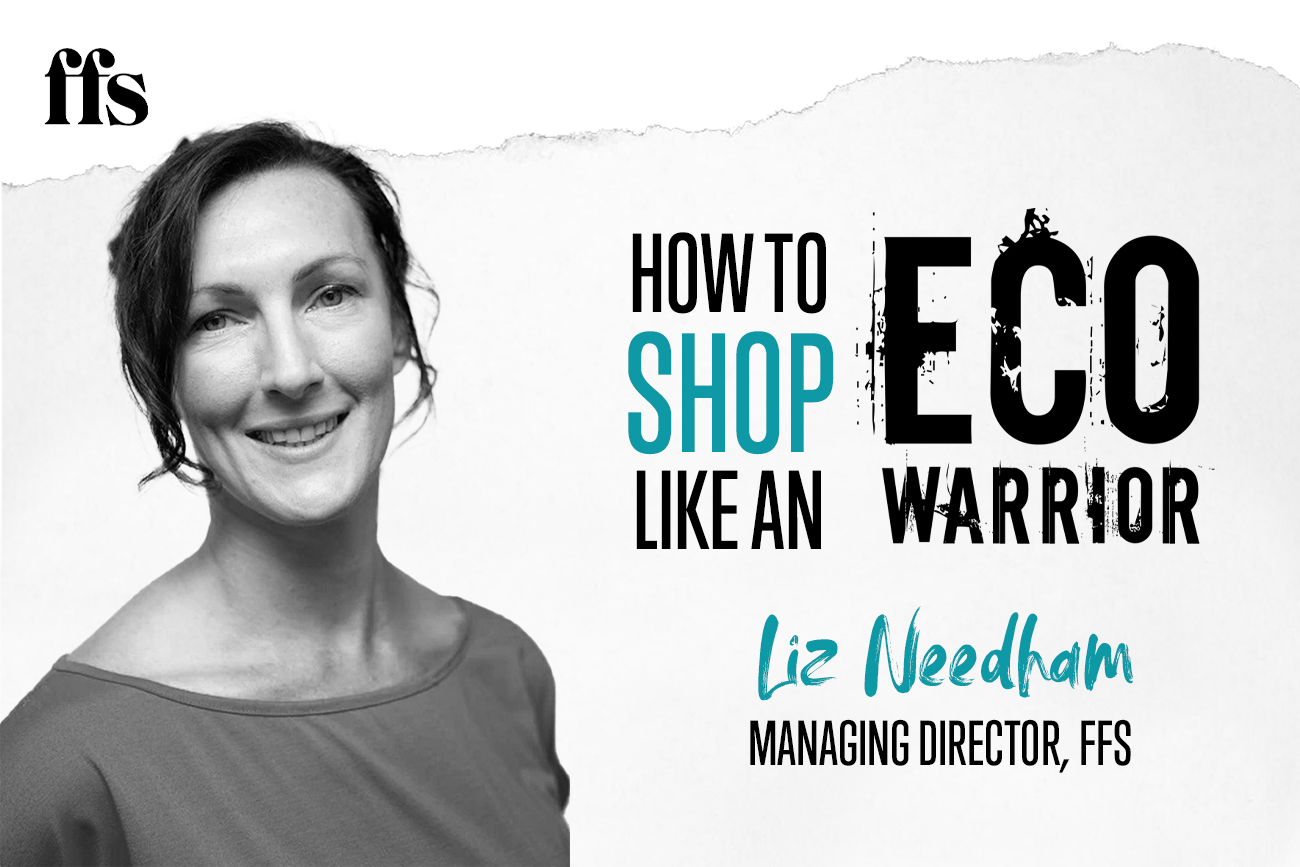We created our ‘How to Shop Like an Eco Warrior’ podcast series to help you get a step closer to living a greener, more sustainable lifestyle. Throughout the series we discuss the issues, share the trends and ideas through interviews with other awesome and exciting challenger brands. And ultimately, you’ll go away inspired and empowered to make little changes in your life that will help protect the earth.
Read below to read our full interview with Liz Needham, Managing Director of FFS Beauty.

Please introduce yourself and tell us a little bit about FFS
I’m Liz Needham, I’m the managing director of FFS and I’ve been here for about four years. Our brand started six years ago and the founders saw an opportunity in the market. The mail subscription service was just starting to take off, you’d got the likes of Dollar Shave Club, and Cornerstone. But there was no one doing it for the ladies, they were just doing it for the men. One of the founders had a strong background in the mailing industry. So they thought, well, why don’t we do it for the ladies. And they spoke to their wives and talked about the issues that they have with shaving and the convenience or the inconvenience of having to buy refills, and just thought it was a really good idea. So FFS was born.
Tell us about FFS. Why is it more sustainable? How does it work?
Ok for a start, we’re not disposable razors, the plastic ones that you buy from the shop, we’re a metal handle razor that has durability and is long lasting. If there is anything wrong with that handle, we do replace them. So again, it’s not just going into landfill. We also make sure our packaging is not plastic. So we’ve kept it all to cardboard, which is FSC approved, and we know it is not compromised. When we did our retail packaging in stores, we were one of the first brands to implement cardboard packaging. A lot of the other brands have now followed suit, because we all hate those blister packaging that you can’t get into and you can’t recycle.
We’re cutting out as much plastic as we possibly can with our blade recycling scheme, we realise that our blades have got plastic in them and metal, so you can’t put them in your at-home recycling, and thus they would generally go into your normal household waste. So we offer the scheme for customers to send them back, we can separate the components and the cycles. So every element, we make conscious efforts in what we’re doing to make it as environmentally friendly as we possibly can.
What do you think are the biggest barriers to customers purchasing your products or other sustainable products for the bathroom?
I think the biggest ones are from their beliefs, what they see or what they think. So there’s a belief that sustainable products are going to be more expensive, and they don’t work the same, then it’s not as convenient. So it’s breaking through those barriers that people already have those beliefs. And in some cases, the products might be more expensive, but there’s a reason for that. There’s a reason that plastic has been used for a long time because it is a cheap product or a cheap way of packaging things. So it’s educating people to understand that actually, there’s a reason some for that.
How do you think we can move to a more sustainable future?
There’s a lot that companies can do and there’s a lot that people can do. So I think there needs to be better recycling schemes. So that’s something for councils and the government to put in place, because at the moment, you can’t do the mixed recycling. So you’ve got to separate it yourselves, which is quite prohibitive to a lot of people. I think companies need to think about how they’re developing products. Are companies consciously designing a product so that the end-user can split that product and recycle it?
There also needs to be more clarity on the type of materials that products are made in, there’s loads of confusion in the plastics, what your local recycling centre can or can’t take, is it one to five or two? It’s really confusing. And then people ended up putting it all in the recycling and then it’s contaminated. So there’s got to be more clarity to make it easier for them. And it’s not just contamination from the wrong products. It’s also caused by adding ‘dirty’ containers to your bins too. So there’s got to be education and clarity around that.
There needs to be more clarity from the businesses on the origin of the product, the sourcing of the products. So be open and honest about your supply chain. Where are the goods coming from? Are they being shipped from all over the world? Or are they being made locally? Because that has a big impact on carbon emissions and the overall impact on the environment. So as a company, I think you have a responsibility to be clear on that and not greenwash.
Speaking about Greenwashing, where do you stand on that?
We’ve all seen the marketing that will say a company’s sustainable, but when you actually dig down into it, it is produced in China, and selling the goods into Europe. Is there an alternative? Could those goods have been made locally? So it’s establishing what you class as being a sustainable product? Everyone has, obviously their own version of what is sustainable.
Sustainability has become a buzzword over the years, so every business is going to market using it because that’s where the world is at the moment, it doesn’t mean that it’s really a part of the core company beliefs, so be vigilant!
So if there was one thing that a customer could do tomorrow to be more sustainable, what would it be, other than buying your products, of course!?
I would say the easiest thing that consumers could do is buy things that are in reusable containers. So recycling is brilliant. But obviously, it takes energy and time to recycle anything. So make a conscious decision when you’re actually buying a product. Can I refill this? Can I reuse it? So is it a glass bottle that I can reuse in the kitchen? Or can I go and buy my products from a store where they do the refillable systems? And I think that’s the easiest step.
Last but not least, do you have any other sustainable shopping tips or tricks other than looking out for things that are reusable?
Buy local, don’t forget you’ve got local shops! The most sustainable way is simply walking down your local street. If you’ve got a nice high street, go use it because if you don’t use it, they’re gonna be gone. And then that will make sustainable shopping even harder.


